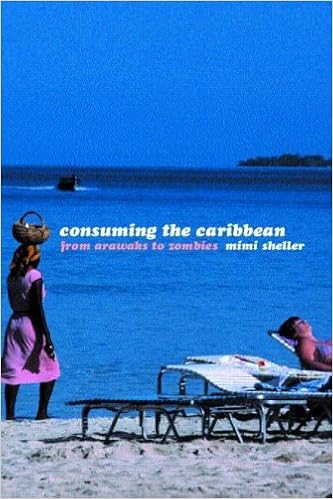
Consuming The Caribbean: From Arawaks To Zombies (International Library Of Sociology) Download Free (EPUB, PDF)

From sugar to indentured labourers, tobacco to reggae music, Europe and North America have been relentlessly consuming the Caribbean and its assets for the past five hundred years. In this fascinating book, Mimi Sheller explores this troublesome history, investigating the complex mobilities of producers and consumers, of material and cultural commodities, including:foodstuffs and stimulants - sugar, fruit, coffee and rumhuman bodies - slaves, indentured labourers and service workerscultural and knowledge products - texts, music, scientific collections and ethnologyentire 'natures' and landscapes consumed by tourists as tropical paradise.Consuming the Caribbean demonstrates how colonial exploitation of the Caribbean led directly to contemporary forms of consumption of the region and its products. It calls into question innocent indulgence in the pleasures of thoughtless consumption and calls for a global ethics of consumer responsibility.

File Size: 2526 KB
Print Length: 263 pages
Simultaneous Device Usage: Up to 4 simultaneous devices, per publisher limits
Publisher: Routledge; 1 edition (December 8, 2003)
Publication Date: December 8, 2003
Sold by: Digital Services LLC
Language: English
ASIN: B0013PKPEW
Text-to-Speech: Enabled
X-Ray: Not Enabled
Word Wise: Enabled
Lending: Not Enabled
Enhanced Typesetting: Enabled
Best Sellers Rank: #983,402 Paid in Kindle Store (See Top 100 Paid in Kindle Store) #248 in Kindle Store > Kindle eBooks > Business & Money > Economics > Commerce #385 in Kindle Store > Kindle eBooks > History > Americas > Caribbean & West Indies #420 in Books > Business & Money > International > Exports & Imports

The island nations of the Caribbean Sea share an awkward relationship with the USA, and one that is an extension of the former's relationship with European colonial powers. The primary theme that runs thru this history is consumption; specifically the consumption of goods, people, and the environment of the Caribbean by white outsiders. Starting with the initial encounters of Columbus and the spaniards, and progressing thru the dictates of the United Fruit Company and tour companies, this book examines the economic relationship between the Caribbean and outside powers.The book is divided into several chapters, and each focuses on one theme of this relationship. One chapter examines the natural goods originating in the Caribbean that have been exploited for foreign consumption, to the point that many Caribbean nations cannot feed themselves with the food they grow. Another chapter looks at how colonial and now Western economic policies have created a social structure that destroyed the local natives, and replaced them with a mix of black slaves and their descendants, creoles, and mulattoes; all living in poverty. All of this benefitted the European and American consumer. Another chapter examines the images of the Caribbean, and how they have been formed and transformed to suit the needs of Westerners, whether they be cruise lines, hotel companies, or fruit companies.The book itself is not too long, but the text is quite condensed with lots of references. The subject matter is a conglomeration of history, economics, sociology, and geography. The topic is interesting, and the approach is innovative. A warning though, the book assumes the reader has some initial historical knowledge of the Caribbean from the 1500's onwards. Overall, a good read but not great.
This book breaks new ground by asking how the Caribbean has been created as an imaginary place, a commoditized image in he minds of the outside world, over the centuries since the islands were first plundered and looted by European adventurers. The paradox is that a part of the world which has been the scene of horrible and brutal genocide, followed by centuries of slavery and colonial exploitation, has developed a public image as an innocent island playground, full of sun & fun.At times the prose is a bit heavy, and the usual array of thick French theorists are paraded through the streets, like an academic carnival. There is nothing particularly unexpected if you know the literature on the region. I would not recommend this as an introduction to the sociology of the Caribbean, but it should be required reading in any advanced course on the area, and it would be useful to read it along with some books on Hawaii, Bali, Israel and Rome to see how identity and tourism have intersected in different ways along different historical trajectories.
Consuming the Caribbean: From Arawaks to Zombies (International Library of Sociology) Pride and Prejudice and Zombies (Movie Tie-in Edition) (Pride and Prej. and Zombies) Caribbean Currents: Caribbean Music from Rumba to Reggae, Revised Edition Fishes of the Caribbean Reefs (Caribbean Pocket Natural History Series) A Field Guide to Southeastern and Caribbean Seashores: Cape Hatteras to the Gulf Coast, Florida, and the Caribbean (Peterson Field Guides) A CARIBBEAN FOOTBALLER'S GUIDE TO STUDY ABROAD: 93% of Caribbean footballers currently studying abroad in the United States of America are on some form of scholarship Pleasures of the Caribbean (MusicCooks: Recipe Cards/Music CD), Caribbean Recipes, Reggae and Calypso Music (Sharon O'Connor's Musiccooks) CHOCOLATE: The Consuming Passion Death by Chocolate: The Last Word on a Consuming Passion The Complete Guide to Drying Foods at Home: Everything You Need to Know about Preparing, Storing, and Consuming Dried Foods (Back to Basics) The Inn at Little Washington Cookbook: A Consuming Passion 101 Recipes for Preparing Food in Bulk: Everything You Need to Know About Preparing, Storing, and Consuming with Companion CD-ROM (Back-To-Basics Cooking) Consuming Work: Youth Labor in America Consuming Ocean Island: Stories of People and Phosphate from Banaba (Tracking Globalization) Consuming the Word: The New Testament and The Eucharist in the Early Church Theories of International Politics and Zombies 2012 International Plumbing Code (Includes International Private Sewage Disposal Code) (International Code Council Series) .NET Framework Standard Library Annotated Reference, Volume 2: Networking Library, Reflection Library, and XML Library The Urban Sociology Reader (Routledge Urban Reader Series) Talking Prices: Symbolic Meanings of Prices on the Market for Contemporary Art (Princeton Studies in Cultural Sociology)



